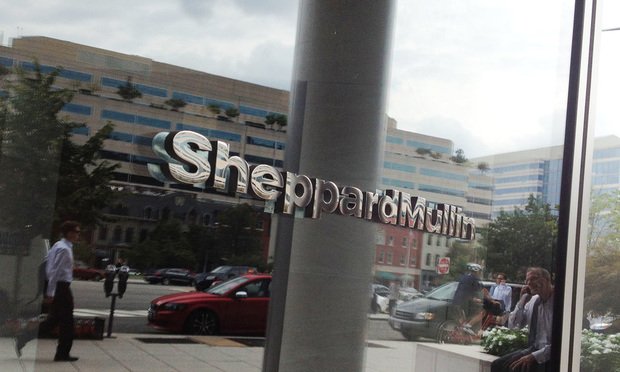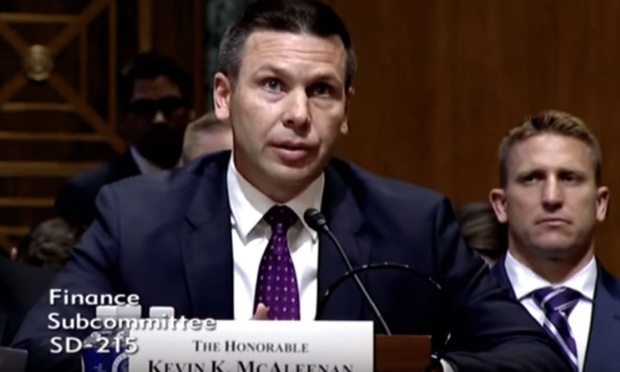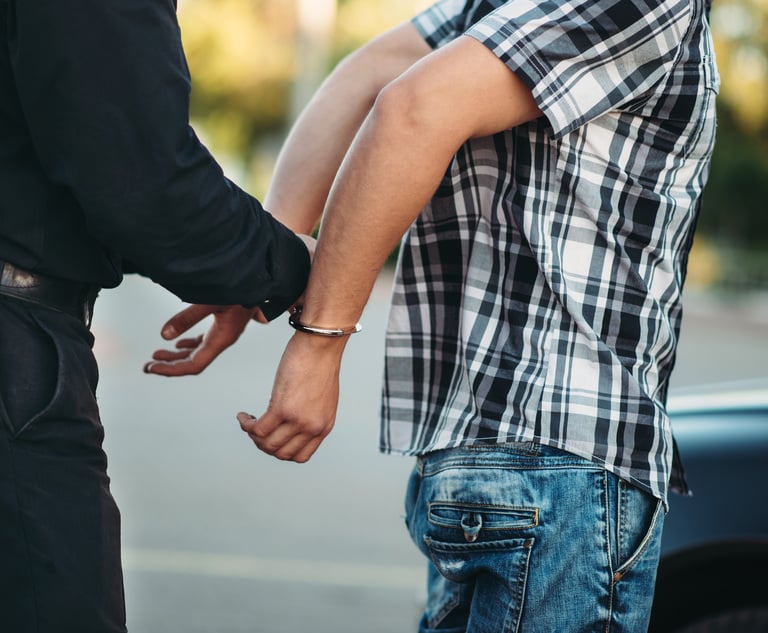Ex-Gunderson, Sheppard Mullin Associate Heads DHS After Nielsen Resignation
Kevin McAleenan, the acting head of the U.S. Department of Homeland Security, was an early associate at the Silicon Valley firm Gunderson Dettmer, and then later at Sheppard Mullin in Los Angeles. He's a 1998 graduate of the University of Chicago Law School.
April 08, 2019 at 09:58 AM
6 minute read
The original version of this story was published on National Law Journal
 Sheppard Mullin offices in Washington. Credit: Diego M. Radzinschi/ NLJ
Sheppard Mullin offices in Washington. Credit: Diego M. Radzinschi/ NLJ
Kevin McAleenan, named the acting head of the U.S. Department of Homeland Security after the abrupt resignation of Kirstjen Nielsen on Sunday, has long-ago Big Law ties and one of his former law school classmates is a U.S. Justice Department lawyer who blessed the Trump administration's first travel ban.
McAleenan is succeeding Nielsen at the helm of Homeland Security, serving as the acting secretary amid substantial turmoil over immigration policies. Nielsen, who met with Trump on Sunday, reportedly did not resign willingly. It's unclear how long McAleenan will serve as the temporary leader.
Nielsen's resignation comes at a critical moment, as the Trump administration faces several lawsuits over the president's use of a national emergency to divert funding to build a wall along the Mexico border and as Trump has threatened to close the Mexico border. Meanwhile, the U.S. Supreme Court is weighing whether to hear a challenge to Trump's move to rescind the Deferred Action for Childhood Arrivals immigration program.
“Despite our progress in reforming homeland security for a new age, I have determined that it is the right time for me to step aside,” Nielsen wrote in her resignation letter. “I hope that the next secretary will have the support of Congress and the courts in fixing the laws which have impeded our ability to fully secure America's borders and which have contributed to discord in our nation's discourse.”
McAleenan has served as the commissioner of U.S. Customs and Border Protection since March 2018. He earlier was the Obama-era deputy commissioner of the agency.
“The border cop image belies what is behind it. McAleenan is an attorney with degrees from the University of Chicago and Amherst College who pours over academic reports on migration trends and speaks of international aid as being vitally important to stemming the northward flow of Central Americans,” according to a report in The Washington Post. Two DHS sources told CNN that McAleenan is not an “ideologue or fire breather” on immigration.
McAleenan's government bios note his law degree and private practice service, and we've got a few details on that part of his career below.
>> McAleenan was formerly an associate in California at two different law firms. He worked at Gunderson, Dettmer, Stough, Villeneuve & Hachigian in Menlo Park from March 2000 to October 2001; and earlier at Sheppard, Mullin, Richter & Hampton in Los Angeles from November 1998 to February 2000. McAleenan got a shout-out in a Sheppard Mullin “alumni moves” feature last year. Greg Berk, based in Orange County, California, leads Sheppard Mullin's immigration practice. Sheppard Mullin's profits per equity partner dipped slightly last year, but revenue and head count grew, according to a report at sibling publication The American Lawyer. Gross revenue increased by 5.4 percent to $707.4 million, and revenue per lawyer was relatively flat at $991,000. Gunderson Dettmer was founded in 1995 in Silicon Valley and focuses on venture capital and emerging technology. “As veterans of the heady dot-com days may recall, Gunderson put itself on the map back in 1999 by leading the charge to $125,000 starting salaries,” Above the Law reported in 2008. McAleenan was admitted to the California state bar in 1998 but his status is now ineligible to practice based on nonpayment of annual dues.
 Kevin McAleenan, commissioner of the Customs and Border Patrol office, testifies in the US Senate. Credit: YouTube
Kevin McAleenan, commissioner of the Customs and Border Patrol office, testifies in the US Senate. Credit: YouTube>> McAleenan graduated from the University of Chicago Law School in 1998. His classmates included Curtis Gannon, Manish Shah and David Sacks. Shah is a former federal prosecutor who is now serving on the U.S. District Court for the Northern District of Illinois. He was reportedly the first judge of South Asian descent to snag a post on that court. Sacks, the entrepreneur and investor, was formerly PayPal's chief operating officer. Gannon is a top lawyer in the Justice Department's Office of Legal Counsel, serving under Assistant Attorney General Steven Engel. Gannon, formerly the acting head of OLC, wrote the January 2017 memo supporting the legality of the Trump administration's travel ban. Gannon was a former clerk to the late Justice Antonin Scalia. McAleenan did not pursue any court clerkships. Prior to graduating law school, McAleenan was a legal assistant at Dewey Ballantine in Washington from September 1994 to March 1995.
>> Customs and border authorities understand “that electronic devices often contain personal information and, for that reason, has taken steps for many years to ensure that border searches of electronic devices are conducted in a judicious and transparent manner,” McAleenan said in a written statement at the time of his confirmation to the agency. He was responding to a question from Sen. Ron Wyden, D-Oregon: “Do you believe, as Chief Justice Roberts has said in the Supreme Court case Riley, that 'cell phones differ in both quantitative and a qualitative sense from other objects?'” McAleenan continued: “CBP takes steps to ensure that it only searches information residing on the device itself, and our agency has applied policy limitations that are above and beyond those which are constitutionally required. Border searches of electronic devices affect less than one-hundredth of one percent of travelers entering the United States, a significant majority of which do not concern U.S. citizens.”
>> “It's really important for your readers to understand the difference between the concept of family separation and prosecuting adults who cross the border illegally, even if they are bringing in children with them. We do not have a policy of administrative separation,” McAleenan told the Los Angeles Times in a Q&A in June 2018. The ACLU responded in a blog post: “McAleenan's comments continued the trend of Trump administration officials attempting to justify this unprecedented and horrific policy by spinning the truth and, worse, by making specious claims with little to no basis in fact.”
Read more:
House of Representatives Sues Trump Administration Over Border Wall
Justice Breyer, in Dissent, Tangles With Kavanaugh Over Immigration
Trump Administration to DC Circuit: You Can't Review DACA Rescission
Donald Trump's Now 1-0 in Border Wall Cases in the Ninth Circuit
This content has been archived. It is available through our partners, LexisNexis® and Bloomberg Law.
To view this content, please continue to their sites.
Not a Lexis Subscriber?
Subscribe Now
Not a Bloomberg Law Subscriber?
Subscribe Now
NOT FOR REPRINT
© 2025 ALM Global, LLC, All Rights Reserved. Request academic re-use from www.copyright.com. All other uses, submit a request to [email protected]. For more information visit Asset & Logo Licensing.
You Might Like
View All
Law Firms Expand Scope of Immigration Expertise Amid Blitz of Trump Orders
6 minute read
Lawyers' Phones Are Ringing: What Should Employers Do If ICE Raids Their Business?
6 minute read
'Where Were the Lawyers?' Judge Blocks Trump's Birthright Citizenship Order
3 minute read
Eleven Attorneys General Say No to 'Unconstitutional' Hijacking of State, Local Law Enforcement
3 minute readTrending Stories
- 1FTX One Year Later: The Impact on Examiner Practice in Bankruptcy Courts
- 2Gen AI Legal Contract Startup Ivo Announces $16 Million Series A Funding Round
- 3DOJ's Flawed Thinking in Challenging HPE-Juniper Merger
- 4Annual Self-Check: Testing For Bias On The Bench
- 5'None of Us Like It': How Expedited Summer Associate Recruiting Affects Law Students and the Firms Hiring Them
Who Got The Work
J. Brugh Lower of Gibbons has entered an appearance for industrial equipment supplier Devco Corporation in a pending trademark infringement lawsuit. The suit, accusing the defendant of selling knock-off Graco products, was filed Dec. 18 in New Jersey District Court by Rivkin Radler on behalf of Graco Inc. and Graco Minnesota. The case, assigned to U.S. District Judge Zahid N. Quraishi, is 3:24-cv-11294, Graco Inc. et al v. Devco Corporation.
Who Got The Work
Rebecca Maller-Stein and Kent A. Yalowitz of Arnold & Porter Kaye Scholer have entered their appearances for Hanaco Venture Capital and its executives, Lior Prosor and David Frankel, in a pending securities lawsuit. The action, filed on Dec. 24 in New York Southern District Court by Zell, Aron & Co. on behalf of Goldeneye Advisors, accuses the defendants of negligently and fraudulently managing the plaintiff's $1 million investment. The case, assigned to U.S. District Judge Vernon S. Broderick, is 1:24-cv-09918, Goldeneye Advisors, LLC v. Hanaco Venture Capital, Ltd. et al.
Who Got The Work
Attorneys from A&O Shearman has stepped in as defense counsel for Toronto-Dominion Bank and other defendants in a pending securities class action. The suit, filed Dec. 11 in New York Southern District Court by Bleichmar Fonti & Auld, accuses the defendants of concealing the bank's 'pervasive' deficiencies in regards to its compliance with the Bank Secrecy Act and the quality of its anti-money laundering controls. The case, assigned to U.S. District Judge Arun Subramanian, is 1:24-cv-09445, Gonzalez v. The Toronto-Dominion Bank et al.
Who Got The Work
Crown Castle International, a Pennsylvania company providing shared communications infrastructure, has turned to Luke D. Wolf of Gordon Rees Scully Mansukhani to fend off a pending breach-of-contract lawsuit. The court action, filed Nov. 25 in Michigan Eastern District Court by Hooper Hathaway PC on behalf of The Town Residences LLC, accuses Crown Castle of failing to transfer approximately $30,000 in utility payments from T-Mobile in breach of a roof-top lease and assignment agreement. The case, assigned to U.S. District Judge Susan K. Declercq, is 2:24-cv-13131, The Town Residences LLC v. T-Mobile US, Inc. et al.
Who Got The Work
Wilfred P. Coronato and Daniel M. Schwartz of McCarter & English have stepped in as defense counsel to Electrolux Home Products Inc. in a pending product liability lawsuit. The court action, filed Nov. 26 in New York Eastern District Court by Poulos Lopiccolo PC and Nagel Rice LLP on behalf of David Stern, alleges that the defendant's refrigerators’ drawers and shelving repeatedly break and fall apart within months after purchase. The case, assigned to U.S. District Judge Joan M. Azrack, is 2:24-cv-08204, Stern v. Electrolux Home Products, Inc.
Featured Firms
Law Offices of Gary Martin Hays & Associates, P.C.
(470) 294-1674
Law Offices of Mark E. Salomone
(857) 444-6468
Smith & Hassler
(713) 739-1250






